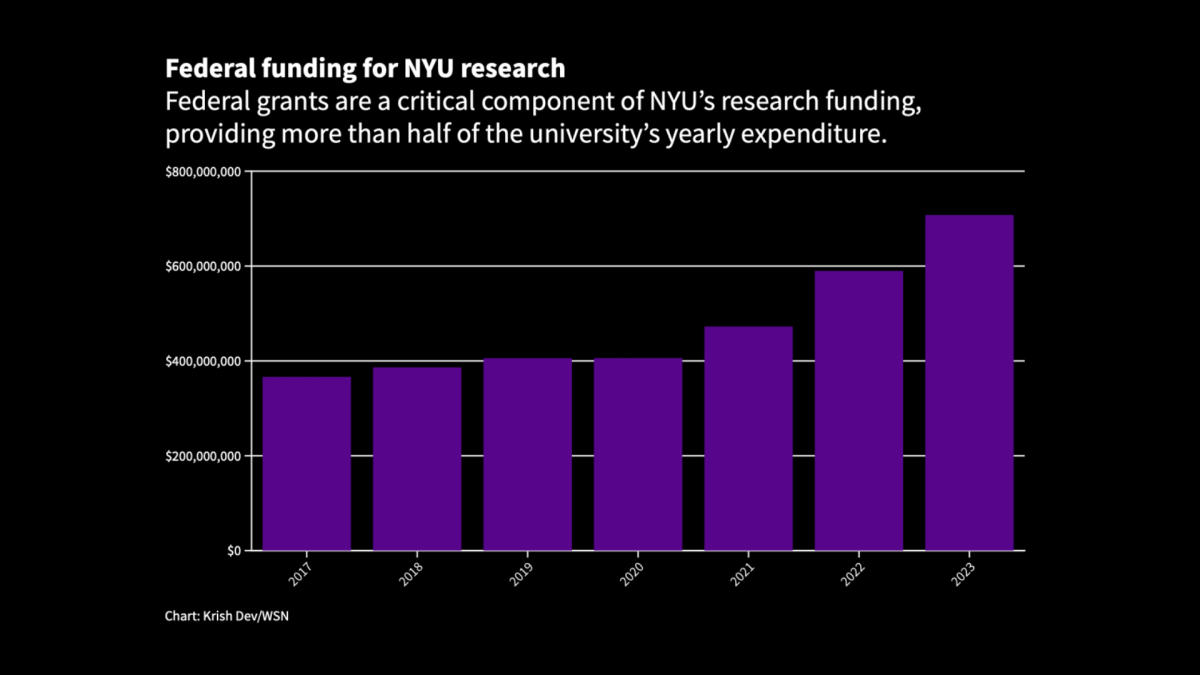Federal grants are a critical component of NYU’s research funding, providing more than half of the university’s yearly expenditure. However, with President-elect Donald Trump soon to take back the White House, experts have speculated that the U.S. government could withhold grants for projects that counter its political values, specifically research focused on climate change or social sciences.
For all four years of his previous term, Trump proposed billions in cuts to research funding for the National Institutes of Health, the National Science Foundation, the Department of Energy and NASA, but Congress consistently rejected his initiatives and instead approved bipartisan bills that increased research spending. However, with both chambers leaning further right following the election, Trump may have a better likelihood of enacting his budgetary changes.
During President Joe Biden’s administration, NYU has received an average of nearly $600 million in research grants annually, which decreases to $76 million without funding from the Department of Health and Human Services. Under Trump’s first administration, NYU’s average research funding was around $400 million per year, or $70 million excluding health-related grants. Since Trump announced his plans to nominate Robert F. Kennedy Jr. as his health secretary, discussion of potential reform to the NIH — and to medical research — has circulated among public health experts.
Research grants go through a series of peer reviews before making it to legislative committees, where policymakers evaluate the request. However, decisions on approval are contingent on how the government’s Research and Development fund is allocated across departments, and who the committee members are.
One of the largest changes in research funding at NYU was from the Environmental Protection Agency, which allocated an average of around $1 million annually to the university from 2021 to 2023, representing around 0.18% of the average yearly federal budget. Before 2021, NYU only received around $30,000 annually from the EPA — around 0.008% of Trump’s research funding toward the university — as the former president dismantled over 100 rules and policies aimed at mitigating climate change over the four years.
In its report on Research and Development budget allocations, the Trump administration addressed concerns from committee members regarding its $30 million allocation toward the EPA, arguing that “EPA R&D activities” are primarily funded through a broader Science and Technology budget. In an overview of changes to Research and Development from March 2023, the Biden administration noted the $16.5 billion it had allocated toward climate change and clean energy research via the EPA.
While Trump had proposed budget cuts for most health and science-based research, he bolstered funding for programs specifically focused on artificial intelligence and quantum information science. His administration had said that these programs represented “bold national strategies” and “a pro-growth regulatory agenda,” and White House science advisors reiterated that they had lowered funding in other areas to focus more on the selected areas.
In a recent report on Research and Development, the Biden administration also boasted billions allocated to projects for artificial intelligence and machine learning, as well as to a program that boosts the domestic memory chip manufacturing industry. The report also highlighted significant funding toward public health research and environmental initiatives to push the country toward net-zero greenhouse gas emissions by 2050.
Throughout both administrations, the top five departments that fund NYU’s research have remained the same. More than half of NYU’s annual non-health federal research funding is from the NSF, which gave the university around $36 million per year during Trump’s administration and $41 million per year during Biden’s. Other major contributors across both administrations have included the Department of Defense, the Department of Energy and the Department of Education.
In June, leaders of the House Committee on Science, Space and Technology sent letters to the Department of Energy, the Department of Commerce, the NSF, the EPA and NASA to argue that universities could lose eligibility for federal grant funding if they violate Title VI, which prohibits discrimination based on color, race and national origin. The letters specifically referenced schools’ implementation of the federally-mandated definition of antisemitism, which was added in 2016 and includes “the targeting of the state of Israel, conceived as a Jewish collectivity,” among other things.
Congressional Republicans have repeatedly criticized NYU and other private universities for their Title IV policies since campuses saw a wave of pro-Palestinian demonstrations last year. In December, Rep. Elise Stefanik, a representative from New York and Trump’s nominee for UN ambassador, held a press briefing where she had an NYU student discuss antisemitism on campus.
“It’s unrealistic to think that the federal government is going to pour all this money into this and give private universities access to this money without having something to say about whether they are acting in the public interest,” Sandy Baum, a former professor at Skidmore College, told WSN. “What we’re really talking about is different opinions about what it means to act in the public interest.”
NYU ranked 15th nationally for spending on research and development, spending $1.276 billion in 2022. In an interview with WSN, David Rosowsky, the former vice president for research at Kansas State University, emphasized that while federal grants play a large role in the university’s research, its endowment can help counteract potential losses.
“If, for example, agencies decided not to direct funding to climate change, there will be private organizations, philanthropists, foundations, individuals, who will say, ‘This is important to me and I will fund your research,’” Rosowsky said.
Contact Gigi Liman at [email protected].























































































































































